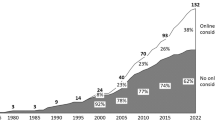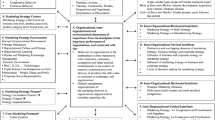Abstract
We analyze the role of consumer expectations in a Hotelling model of price competition when products exhibit network effects. Expectations can be strong (stubborn), weak (price-sensitive) or partially stubborn (a mix of weak and strong). As a rule, the price-sensitivity of demand declines when expectations are more stubborn. An increase of stubbornness (i) increases (decreases) the parameter region with a unique duopoly equilibrium (multiple equilibria), (ii) reduces competition, (iii) reduces the conflict between consumer and social preferences for de facto standardization, and (iv) reduces the misalignment between consumer and social preferences for compatibility.
Similar content being viewed by others
References
Baake P, Boom A (2001) Vertical product differentiation, network externalities, and compatibility decisions. Int J Ind Organ 19: 267–284
Becker G (1991) A note on restaurant pricing and other examples of social influences on prices. J Political Econ 99: 1109–1116
Corneo G, Jeanne O (1997) Conspicuous consumption, snobbism and conformism. J Public Econ 66: 55–71
Corneo G, Jeanne O (1997) Snobs, bandwagons, and the origin of social customs in consumer behavior. J Econ Behav Organ 32: 333–347
David PA, Greenstein S (1990) The economics of compatibility standards: an introduction to recent research. Econ Innov New Technol 1: 3–41
d’Aspremont C, Gabszewicz JF, Thisse JF (1979) On hotelling’s stability in competition. Econometrica 47: 1145–1150
Farrell J, Katz ML (1998) The effects of antitrust and intellectual property law on compatibility and innovation. Antitrust Bull 43: 609–650
Farrell J, Klemperer P (2007) Coordination and lock-in: competition with switching costs and network effects. In: Armstrong M, Porter R (eds) Handbook of industrial organization, vol 3. Elsevier, Amsterdam, pp 1967–2072
Farrell J, Saloner G (1992) Converters, compatibility, and the control of interfaces. J Ind Econ 40: 9–35
Glazer A, Kanniainen V, Mustonen M (2006) When a loser gains: free riding in the innovation of network goods. J Econ 87: 55–71
Grilo I, Shy O, Thisse J-F (2001) Price competition when consumer behavior is characterized by conformity or vanity. J Public Econ 80: 385–408
Katz ML, Shapiro C (1985) Network externalities, competition, and compatibility. Am Econ Rev 75: 424–440
Kristiansen E, Thum M (1997) R&D incentives in compatible networks. J Econ 65: 55–78
Shapiro C, Varian H (1999) Information rules. Harvard Business School Press, Boston
Shy O (2001) The economics of network industries. Cambridge University Press, Cambridge
Author information
Authors and Affiliations
Corresponding author
Rights and permissions
About this article
Cite this article
Suleymanova, I., Wey, C. On the role of consumer expectations in markets with network effects. J Econ 105, 101–127 (2012). https://doi.org/10.1007/s00712-011-0223-y
Received:
Accepted:
Published:
Issue Date:
DOI: https://doi.org/10.1007/s00712-011-0223-y




